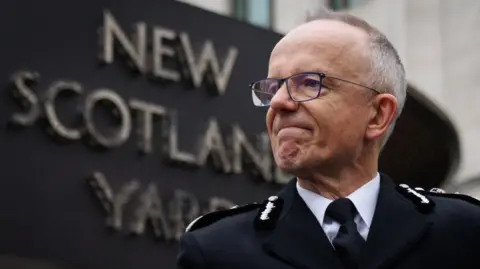The issue of knife crime in London is becoming increasingly urgent, as highlighted by Sir Mark Rowley, the Metropolitan Police Commissioner. In a recent warning to the London Policing Board, Rowley stated that without additional government funding, rates of knife crime, along with violence against women and theft, are likely to escalate. This alarming prediction underscores the critical need for financial support if the police force aims to confront the challenges posed by rising crime statistics.
In his report, Sir Mark Rowley emphasized that the Metropolitan Police (Met) faces a dire financial situation. He candidly acknowledged that the ongoing budget constraints are compelling the organization to scale back significantly. Despite receiving some unexpected financial relief from the Home Office and City Hall, which improved the Met’s budget by nearly £100 million compared to earlier forecasts, Rowley indicated that the overall conditions remain insufficient. In November 2024, he had previously warned of a potential funding shortfall of £450 million, which could necessitate severe cuts to police services.
The commissioner conveyed a sense of urgency regarding the upcoming spending review, stating that without further investments allocated in June, the government risks failing to achieve its own ambitious objectives. Specifically, Rowley referenced the national promises to reduce knife crime and violence against women and girls over the next ten years, indicating that such priorities could be jeopardized by inadequate funding.
Home Secretary Yvette Cooper confirmed that an evaluation of the Met’s financial state is currently underway, conducted in collaboration with the London Mayor and Scotland Yard. Currently, the Met employs approximately 31,248 officers and 10,972 staff, far short of its goal to have 38,000 officers and 19,000 staff. As a result, Sir Mark anticipates the loss of about 1,700 personnel unless there is an influx of funding. The additional financial resources could facilitate accelerated recruitment, potentially mitigating personnel losses.
The report presented by Sir Mark also highlighted the notion of “less capacity, increasing demand.” With continuously rising demands on police forces, the report warns that without significant investment, London could endure sustained surges in knife crime, domestic violence, and other criminal activities. Rowley expressed concerns regarding the police’s capacity to respond effectively to crimes and support victims when stretched thin.
Given the severity of the projected cuts, the Metropolitan Police has begun outlining a series of potential savings measures aimed at preserving frontline services. Sir Mark identified potential savings that would involve eliminating the Royal Parks Police and Safer Schools officers, as well as cuts to forensics and mounted divisions. These cuts could further hinder the police force’s operational efficacy.
Rowley also cautioned that the financial challenges faced by the Met would negatively influence ongoing reform efforts, mandated in the wake of a critical review led by Baroness Casey two years ago. The report indicates that actualizing the necessary reforms would be challenging without considerable financial investment.
Importantly, Sir Mark’s report references overarching commitments made in the government’s manifesto concerning crime in London. He asserted, “Halving knife crime and violence against women and girls will be impossible without significant reductions in London.” Additionally, he pointed out the economic ramifications of persistent crime, estimating that London suffers from significant financial losses—around £36.5 billion annually—due to crime-related issues. Moreover, he stated that investing in policing yields returns, where every £1 spent generates at least £4 for the country’s GDP.
Lastly, the report forewarns that the Met may have to close approximately half of its facilities due to them becoming uninhabitable or non-compliant. This development could further exacerbate the challenges faced by the police force, diminishing their ability to serve the London community effectively. As Londoners and stakeholders look towards the government’s ongoing decisions, the emerging financial landscape will be critical to determining the future efficacy and sustainability of policing strategies in the capital.



